
The Matterhorn is a mountain of the Alps, straddling the main watershed and border between Italy and Switzerland. It is a large, near-symmetric pyramidal peak in the extended Monte Rosa area of the Pennine Alps, whose summit is 4,478 metres (14,692 ft) above sea level, making it one of the highest summits in the Alps and Europe. The four steep faces, rising above the surrounding glaciers, face the four compass points and are split by the Hörnli, Furggen, Leone/Lion, and Zmutt ridges. The mountain overlooks the Swiss town of Zermatt, in the canton of Valais, to the northeast; and the Italian town of Breuil-Cervinia in the Aosta Valley to the south. Just east of the Matterhorn is Theodul Pass, the main passage between the two valleys on its north and south sides, which has been a trade route since the Roman Era.

Edward Whymper FRSE was an English mountaineer, explorer, illustrator, and author best known for the first ascent of the Matterhorn in 1865. Four members of his climbing party were killed during the descent. Whymper also made important first ascents on the Mont Blanc massif and in the Pennine Alps, Chimborazo in South America, and the Canadian Rockies. His exploration of Greenland contributed an important advance to Arctic exploration. Whymper wrote several books on mountaineering, including Scrambles Amongst the Alps.
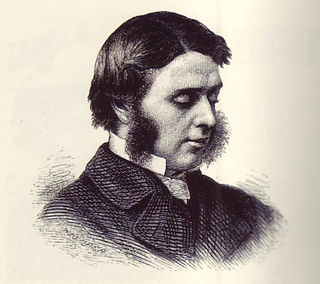
Charles Hudson was an Anglican chaplain and mountain climber from Skillington, Lincolnshire, England.

Marguerite "Meta" Claudia Brevoort was an American mountain climber and pioneer in alpine history, known for her many first ascents and as a trailblazer in winter mountaineering.

The Ober Gabelhorn is a mountain in the Pennine Alps in Switzerland, located between Zermatt and Zinal.

Melchior Anderegg, from Zaun, Meiringen, was a Swiss mountain guide and the first ascensionist of many prominent mountains in the western Alps during the golden and silver ages of alpinism. His clients were mostly British, the most famous of whom was Leslie Stephen, the writer, critic and mountaineer; Anderegg also climbed extensively with members of the Walker family, including Horace Walker and Lucy Walker, and with Florence Crauford Grove. His cousin Jakob Anderegg was also a well-known guide.
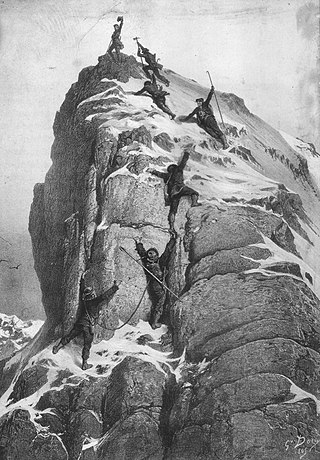
The golden age of alpinism was the decade in mountaineering between Alfred Wills's ascent of the Wetterhorn in 1854 and Edward Whymper's ascent of the Matterhorn in 1865, during which many major peaks in the Alps saw their first ascents.

Michel Auguste Croz was a Chamoniard mountain guide of the Kingdom of Sardinia and the first ascentionist of many mountains in the western Alps during the golden age of alpinism. He is chiefly remembered for his death on the first ascent of the Matterhorn and for his climbing partnership with Edward Whymper.
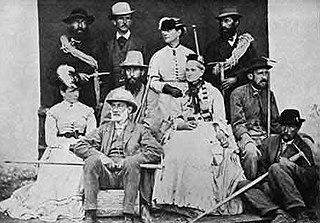
Horace Walker (1838–1908) was an English mountaineer who made many notable first ascents, including Mount Elbrus and the Grandes Jorasses.
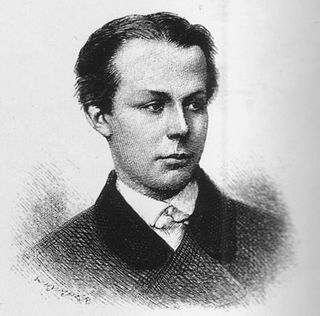
Lord Francis William Bouverie Douglas was a novice British mountaineer. After sharing in the first ascent of the Matterhorn, he died in a fall on the way down from the summit.

Douglas Robert Hadow was a British novice mountaineer who died on the descent after the first ascent of the Matterhorn.

Jean-Antoine Carrel was an Italian mountain climber and guide. He had made climbs with Edward Whymper and was his rival when he attempted to climb the Matterhorn for the first time. Whymper ultimately succeeded in making the mountain's first ascent in July 1865 while Carrel led the party that achieved the second ascent three days later. Carrel was in the group that became the first Europeans to reach the summit of Chimborazo in 1880. He died from exhaustion when guiding a party on the south side of the Matterhorn.
William Penhall was an English mountaineer.
The Mountain Calls is a film directed by Luis Trenker which recreates the struggle between Edward Whymper and Jean-Antoine Carrel for the first successful ascent of the Matterhorn in 1865.
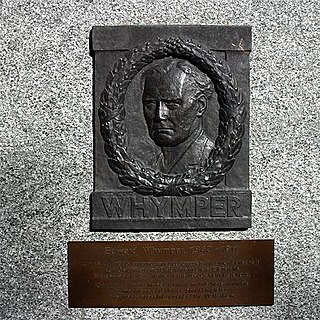
The first ascent of the Matterhorn was a mountaineering expedition of the Matterhorn made by Edward Whymper, Lord Francis Douglas, Charles Hudson, Douglas Hadow, Michel Croz, and two Zermatt guides, Peter Taugwalder and his son of the same name, on 14 July 1865. Douglas, Hudson, Hadow and Croz were killed on the descent when Hadow slipped and pulled the other three with him down the north face. Whymper and the Taugwalder guides, who survived, were later accused of having cut the rope below to ensure that they were not dragged down with the others, but the subsequent inquiry found no evidence of this and they were acquitted.
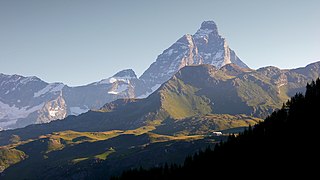
The second ascent of the Matterhorn was accomplished in July 1865, only three days after the successful expedition led by Edward Whymper on the Zermatt side. The second was effected on the Italian side by Jean-Antoine Carrel and Jean-Baptiste Bich with the abbé Amé Gorret and Jean-Augustin Meynet who followed them near to the summit. The party started from Breuil on 16 July and reached the top the following day.
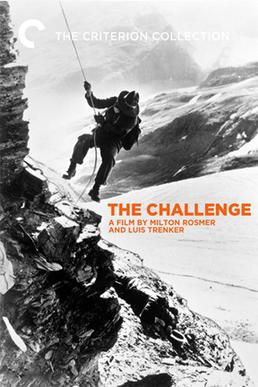
The Challenge is a 1938 British drama film directed by Milton Rosmer and Luis Trenker and starring Robert Douglas and Luis Trenker. The film is about the first successful ascent of the Matterhorn in 1865 by Edward Whymper.

Peter Sarbach (1844–1930) was a pioneer mountain guide from St. Niklaus in Switzerland, near the village of Zermatt. He became notable as a guide in Switzerland, so much so that he was invited to Canada in 1987, becoming the first Swiss guide to work in the Canadian Rockies and helped to establish the need for guiding skills in the area.
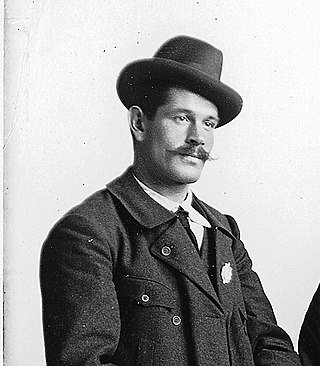
Christian Kaufmann was a Swiss mountain guide who climbed in the Alps, the Canadian Rockies, the Selkirks, the Himalayas, and Norway, accomplishing several dozen first-ascents.

















